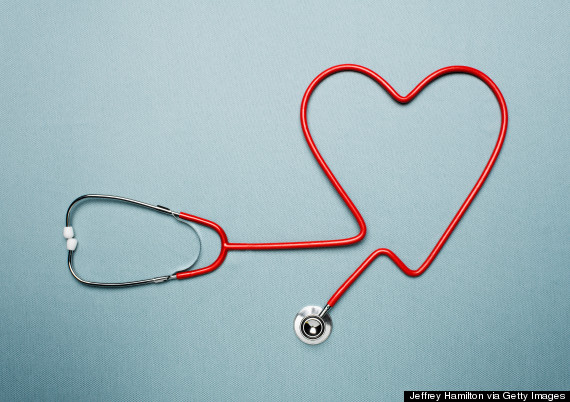
In an era of lawsuits, it can sometimes seem like forgiveness is a concept from biblical times. But a wealth of research suggests we should apply the act to our daily lives because it may hold a myriad of health benefits.
Forgiveness is the act of consciously deciding to let go of resentment or vengeance toward another entity who has harmed you in some way (whether or not they're actually deserving of that forgiveness), according to the Greater Good Science Center at the University of California, Berkeley. (It does not mean having to forget or condone the wrongdoing committed against you.) Fortunately, forgiveness is cultivatable -- and can be practiced through different strategies, including developing empathy, looking for the silver linings and properly expressing your feelings.
Here are all the physical and mental benefits you can reap by learning to forgive:
Forgiving unconditionally could mean a longer lifespan.
People who practice conditional forgiveness -- in other words, people who can only forgive if others say sorry first or promise not to do the transgression again -- may be more likely to die earlier, compared with people who are less likely to practice conditional forgiveness, according to a a 2011 study in the Journal of Behavioral Medicine.
The Luther College researchers explained that apologies can help to move the forgiveness process along, but if "sorry" is a necessary condition for forgiveness, "then there will likely be fewer instances of forthcoming forgiveness for that individual."
"This is due simply to the fact that those who cause an offense will not always fulfill such conditions, regardless of their appropriateness, and the offended party does not have the power to make them occur," they wrote in the study.
It gets you out of that angry mode.
When you're chronically angry, you're in a flight-or-flight mode -- which can have effects on blood pressure and heart rate, according to Johns Hopkins Medicine. But when you truly forgive, that leads to decreased stress, which can help to tamp down the anger. "There is an enormous physical burden to being hurt and disappointed," Karen Swartz, M.D., director of the Mood Disorders Adult Consultation Clinic at The Johns Hopkins Hospital, said in a statement.
And not forgiving someone is associated with more anger, arousal, sadness and feelings of not being in control, according to a 2001 study in the journal Psychological Science. WebMD reported on a Hope College study, showing that when people held on to a grudge, they had higher physiological activity -- facial muscle tension, heart rate, blood pressure and sweating -- compared with when they forgave.
It helps your health across the board (including your sleep!).
A 2005 Journal of Behavioral Medicine study showed that forgiveness is associated with a whole range of health measures, including medications taken, sleep quality and fatigue.
The health benefits of forgiveness seem to come largely from its ability to reduce negative affect (feelings of tension, anger, depression and fatigue), researchers found. With forgiveness, "the victim relinquishes ideas of revenge, and feels less hostile, angry, or upset about the experiences," the University of Tennessee researchers wrote. "The present study suggests that this pathway most fully mediates the forgiveness-health relationship. Thus, health consequences of lack of forgiveness may be carried by increased levels of negative emotion."
"If there is a causal role between forgiveness and health, then reduction of anger, anxiety, and depression may explain how forgiveness operates on the body," they added.
Making amends helps you forgive yourself.
When you are the one who needs forgiveness, making amends with the person you wronged can better help you to forgive yourself, Baylor University researchers found.
In research published in the Journal of Positive Psychology, people who asked for forgiveness for a wrongdoing were found to be more likely to feel like it was OK to forgive themselves. The research also showed that in a hypothetical situation, making amends with a friend who they committed a wrongdoing toward increased the likelihood of the study participants self-forgiving.
"One barrier people face in forgiving themselves is that they feel they deserve to feel bad. Our study found that making amends gives us permission to let go," study researcher Thomas Carpenter, of Baylor University's College of Arts & Sciences, said in a statement.
Your heart will thank you.
That's because forgiveness has been shown in research to have effects on lowering blood pressure. A 2011 study of married couples in the journal Personal Relationships, for instance, showed that when the victim in the situation forgave the other person, both experienced a decrease in blood pressure.
"This study provides the first evidence we are aware of suggesting that receiving forgiveness also predicts positive physiological functioning: Perpetrators who received more conciliatory behavior (as reported by victims) had lower blood pressure than did perpetrators who received less," researchers wrote in the study.
Similarly, a 2003 study in the Journal of Behavioral Medicine showed that forgiveness is associated with decreased blood pressure levels. "Forgiveness may produce beneficial effects directly by reducing allostatic load associated with betrayal and conflict, and indirectly through reductions in perceived stress," researchers wrote.
It could have immune system benefits.
Research presented at a 2011 meeting of the Society of Behavioral Medicine showed that people with HIV who practiced genuine forgiveness toward someone who'd hurt them had higher CD4 cell percentages (considered positive for their immune status), Medscape reported.
"Results support our hypothesis and reflect previous findings on relationships of psychosocial factors with immune makers in people living with HIV/AIDS, and findings indicate that forgiveness of another person may be beneficial for their health," study researcher Amy Owen, Ph.D., of the Duke University Medical Center, told Medscape.
It can strengthen your relationship after infidelity. 
Truly forgiving your partner after infidelity can be the key to saving (and even strengthening) the relationship, a recent study from University of Missouri-Kansas City researchers showed.
In fact, the Couple and Family Psychology: Research and Practice study showed that forgiveness trumped time, relationship satisfaction and commitment in overcoming the hurt from infidelity, researchers found.
Being a forgiving person could protect against longterm stress.
Having the trait of forgiveness (what researchers called "forgivingness") independently predicts positive mental and physical health, according to a recent study in the Journal of Health Psychology, conducted by researchers from Luther College, the University of California, Davis and the University of California, Los Angeles.
In addition, researchers found that forgivingness seemed to protect against stress's negative effects on mental health. "We found that lifetime stress severity was unrelated to mental health for persons who were highest in forgivingness, significantly associated with poorer mental health for persons exhibiting moderate levels of forgivingness, and most strongly related to poorer mental health for participants exhibiting the lowest levels of forgivingness," they wrote.